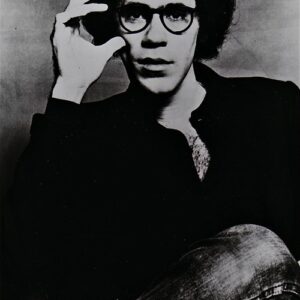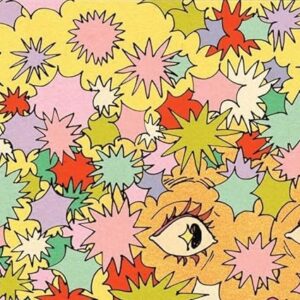
Remembering the Egyptian Childhood I Never Had Through Its Culinary Traditions
Jasmin Attia on Homesickness and Having a Foot in More Than One Country
Every grape leaf has a smooth side. My mother explains this as we sit at her round breakfast table. She dips her hand into the bowl of washed grape leaves, gently peeling one away from the stack. She gives me a wet leaf to feel so that I can rub my fingers across it. The smooth side goes on the outside. She says this, motioning for me to lay it on the plate, smooth side down.
I follow her instructions, molding a row of beef and rice mixture that she’d seasoned and prepared. Don’t forget that the meat should be fatty. Don’t be lazy. Always remove the stem. Nobody wants to eat a stem. This she is adamant about. Then in what is, to me, a small miracle, we fold the fragile leaf over the meat and roll it so tight that it will remain closed even after spending hours in a roiling pot of broth, sumac, and lemon.
My earliest memories take place at the age of three or four in our small green-carpeted apartment in Boston when I was little enough to fit into my mother’s yellow laundry basket. I vaguely understood the duality of our lives then, the two places that were both called home, Egypt and America. At the time, my parents spoke to me mostly in Arabic, and it was in this mother tongue that they told me stories of those left behind, aunts and uncles, grandparents, neighbors.
Sometimes I think my parents were afraid they might fade into the ether if I didn’t understand what home meant to them. In a sense, they were probably right.
I don’t remember exactly when I learned my parents were immigrants, that Cairo had once been their beloved city, that my grandmother was a famous actress (always said with the word famous stretched out like it deserved more time), or that I was my parents’ first real made in America product. You’re an American, my father would say this proudly. These were things I just knew, and trying to recall the time I learned them is as impossible as knowing the day I learned my own name.
They were factual anchors that held together the tapestry of who I am, but the hues of the tapestry, the shape and feel of immigration was a much more complex portrait that I would come to see and admire throughout the decades of my life. Each recollection of my parents’ lives as young immigrants would eventually reconfigure itself into a deeper insight of what it means to untether oneself from home. What I’ve come to understand is the untethering never really happens, and the in-between state is sublime bliss and unimaginable pain.
Like so many other aspects of being partly foreign, the word ghorba and its untranslatable meaning live in a liminal space in my mind, the space that aches to create meaning out of a culture with no equivalents.
There’s an Arabic word, ghorba. that has no real equivalent in English. Loosely translated, it means homesickness, and I define it as an intense longing for one’s homeland. Like so many other aspects of being partly foreign, the word ghorba and its untranslatable meaning live in a liminal space in my mind, the space that aches to create meaning out of a culture with no equivalents.
My aunts and mother have been gathering for decades around tables, preparing hundreds of grape leaves that will take hours to make but only seconds to consume. My late grandmother is something of a legend, fingers stuffing and rolling so fast that you couldn’t see how she did it.
But my hands must still learn what the right amount of meat feels like between my fingers. There is no recipe in my family, nothing written down, no measurements. Measurements are for the inept. This is my mother’s mantra. We, the proud women of the family, we feel and smell and taste and touch and create. We know when it is good because we know when it is good. But some of the clan is gone, and they are only echoes now. My mother and I don’t speak of the deceased, but we understand why I must be the one to roll. I am soaking in the instruction. It is a heavy responsibility.
In my childhood home, Saturdays were for nostalgia. My mother made fava beans with oil, lemon, and sometimes cumin, and if she could get her hands on real basterma (sometimes someone could get it from Montreal), she’d cut it up and cook for my father eggs with pastrami, the kind of pastrami made with so much fenugreek you spent days sweating it out. In the ’80s and ’90s we listened to cassette tapes of Abd El Halim Hafez and Om Kalsoum. When the soulful melodies poured into our tiny family room, my parents often wept.
I remember not understanding then. How could I at such a young age, but something different from understanding was happening, something like a genetic memory of experiences I’d never had, people that I missed whom I’d never met. It was like a song playing so faintly that only the wispiest tendrils threaded through me, but I became greedy for it all.
After the tapes played, front and back of course, and the breakfast was eaten, it was time for the weekly phone calls to Cairo. There was a calculation for this. Egypt was seven hours ahead of East Coast time, and we had to wait until the family in Cairo would be gathered in the aunt’s house that had just gotten a telephone line. These transatlantic calls were one-way only. An international call couldn’t be made from a regular line out of Egypt at the time. So, it was incumbent upon those who left to call home, to reach back into the force field that kept us in orbit.
In those days you had to yell to be heard, and the sound came in and out. Entire phrases were lost somewhere over the Atlantic, a casualty of immigration. I heard my parents’ voices carrying euphoria at the sound of their loved ones, and then grief at the realization that a deep dark ocean still separated them.
My mother is unsatisfied with my first ten grape leaves. She shakes her head. My stuffed grape leaves are too short, too long, too thick, or too loose. They would never last through the cooking process. She shows me how to unroll them and correct my mistakes. I oblige because I now understand the pain of ghorba, and I must assuage it by rolling the grape leaves. I must get it right for I am now the one who is to carry the secrets of this near sacred process, and I am the one who cannot let it fade.
One time in my teenage years, I gripped about an old and very long song they were listening to in the car. I was stuck in the back seat, and the classical Arabic eluded me. I hate this music, and I don’t understand the words. I told them this, already sensing the guilt. How could I hate something as precious as Abd El Halim’s voice? It’s not a song. It’s a poem, my mother said, aware of my nascent love for literature. It had been composed for the lyrics of Nizar Qabbani’s poem about a fortune teller who could read the future in coffee cups. She translated the song in the car.
Mesmerized by the epic poem, I imagined a fortune teller and a broken-hearted man searching for his lost princess whose hair was so long and curly, it could travel the world. A princess with curly hair, just like yours, my father tells me, his hands on the steering wheel, his smile flashing in the rearview mirror.
I have faint memories of my first visit to Cairo at the age of four, running up and down the corridors of my aunt’s luxury apartment in Zamalek, watching the sun set over the Nile from her front balcony, driving up the Giza Plateau to see the pyramids, and shopping with my mother in the Khan El Khalili market for gifts of papyrus and essential oils.
But my most vivid recollection is of visiting my grandmother, Ragaa Abdou, who would later inspire a novel. By the time I met her, she had already retired. Her bedroom was a shrine to her career, crowded with memorabilia. There were towers of magazines that had featured her, records and cassette tapes, framed photos of her in her heyday, drawers filled with jewelry given to her by princes and kings of Iraq and Kuwait. Some pieces she later gifted me shortly before her death in 1999. She told me stories of how she auditioned for a radio spot and how her father had worked for the telephone company.
I can’t help but wonder about the gravity that keeps pulling me back.
In the years that followed my first visit, I returned to Egypt numerous times, spending summers with family and friends. In college, I studied Arabic, earning a minor in the mother-tongue language in which I was once illiterate. I read Naguib Mahfouz’s Cairo Trilogy, which left an indelible mark on my imagination, undoubtedly influencing my writing. And despite my vows never to marry an Egyptian, I met the love of my life in Egypt. I can’t help but wonder about the gravity that keeps pulling me back.
My mother and I roll about a hundred grape leaves. They are now ready to be cooked. We lay them in a pot one layer at a time, one arranged horizontally and the next vertically. Garlic cloves are inserted throughout. A soup is made. You must put in sumac. No sumac, no waraa eynab. I understand this. My mother grabs a handful of the crimson powder, its lemony scent filling the air around us, and she drops it into the pot. The soup can’t be too loose. She stirs the unready soup with a spoon. It must be just the right thickness, and not too salty.
She shows me what is right. I must taste it to know. I must see it. I pour the soup over the precisely arranged grape leaves so that I can see just how much of them should be covered with soup. Too much soup and you get mush. Too little soup and you get cardboard. Both very bad outcomes for an Egyptian apprentice like me.
My mother teaches me in a house she built with my father. It is their dream home, designed for them in the ’90s by a Korean architect. It sits on a coveted river-front lot. They’ve put two children through college, witnessed the birth of their grandchildren. This bliss too is a byproduct of ghorba. But there is no happiness for them without the longing. Always, there is longing. A song came out recently called “Sallem Aala Masr” by a Lebanese singer named Hiba Tawji. It’s the kind of song that brings the ghorba to the surface in a tsunami of tears. If my parents could have ever written a song, this is the one that they would have penned.
“Greet Egypt street by street, address by address, person by person each by name. Say hello to the effusive, hospitable Egypt. Tell her that I miss her and that I miss the songs of Om Kalsoum to which I have loved and have been loved. To Egypt, one hundred million kisses, and to my friends and loved ones a hundred million flowers. My love. My Egypt. Tell her that she is always on my mind. She is the stories of old. She is history etched in stone.”
My parents had a few leather suitcases they brought with them from Egypt. I think they were brown leather, and in my oldest memory they had large front buckles. As they purchased new suitcases, those buckled brown ones were designated for photographs.
Now, as I look back at my life and theirs, there is always another invisible suitcase being unpacked, one shapeless, ethereal treasure at a time. The suitcase has a limitless capacity. This time I got grape leaves. Who knows what tomorrow brings?
______________________________

The Oud Player of Cairo by Jamin Attia will be out on July 11th from Schaffner Press.
Jasmin Attia
Jasmin Attia is a 2021 graduate of the MFA program at Bennington College, and 2022 winner of the Nicholas Schaffner Award for Music in Literature. She has attended the Bread Loaf Writers Conference, and served as a mentor for the Cream Literary Alliance in West Palm Beach. Her writing on Arab Feminist Writers appears in AWP's The Writer's Chronicle. She also holds a bachelor's degree in Finance from the University of Florida and an MBA from the University of Rochester. Jasmin lives with her family in Palm Beach Gardens, Florida, and came to writing as a second career. Her debut novel, The Oud Player of Cairo, will be published by Schaffner Press this summer.



















